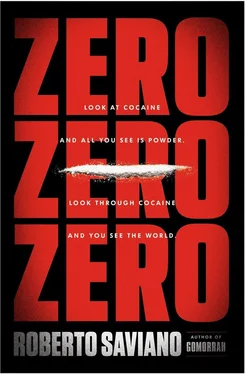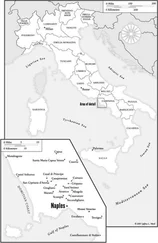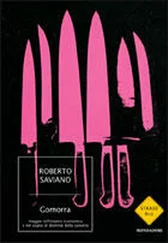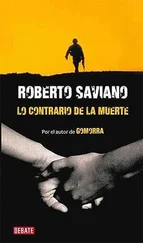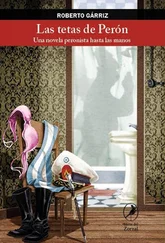Old Arturo is like a sphinx. None of his children are narcos. None of his grandchildren are narcos. None of their wives are narcos. But the narcos respect him because he was the first opium smuggler in the entire area. Arturo went from gomero to broker. He didn’t simply grow poppies; he mediated between producers and traffickers. He kept it up until the 1980s, and that was only the beginning, because back then most of the heroin that made its way to America was handled by Mexicans. Arturo had become a powerful, well-to-do man. But something ended his activity as opium broker. That something was Kiki. After the Kiki ordeal Arturo decided to go back to growing grain. He abandoned opium and the men who dealt in heroin and morphine. It’s an old story, the one about Kiki. From many years ago. But it’s a story that Arturo never forgot. So when his children said they wanted to traffic in coke, just as he had in opium, Arturo realized the time had come to tell them the story of Kiki. If you don’t know it, it’s well worth hearing. Arturo took his children outside the city and showed them a hole, now full of flowers, most of them dried. A deep hole. And he told them the story. I’d read it but hadn’t understood how decisive it was until I got to know the strip of land called Sinaloa, a paradise where people endure punishments worthy of the worst inferno.
• • •
The story of Kiki is linked to that of Miguel Ángel Félix Gallardo, whom everyone knows as El Padrino, the Godfather. Félix Gallardo worked for the Federal Judicial Police of Mexico, and then worked as a bodyguard for the family of Governor Leopoldo Sánchez Celis, from which perch he began amassing his understanding and his power. As a police officer he tracked smugglers, studied their methods, uncovered their routes, arrested them. He knew everything. He hunted them down. Eventually he would go to their bosses and propose that they organize, but under one condition — that they choose him as their boss. Whoever accepted became part of the organization, whoever preferred to remain independent was free to do so. And later killed. Arturo agreed to join. The era of transporting marijuana and opium on a large scale had begun for Félix Gallardo. He got to know personally every inch of every access route into the United States: where you could climb over, where trucks or horses could slip through. There weren’t any cartels in Mexico back then; Félix Gallardo created them. Cartels. Everyone calls them that now, even kids who don’t really know what the word means. Most of the time, it’s exactly the right word. Groups that manage coke, coke capital, coke prices, coke distribution. That’s what cartels are. After all, “cartel” is the economic term for a group of producers who agree on prices, production levels, and how, when, and where to distribute. This holds for the legal as well as the illegal economy. The prices in Mexico were decided by only a few drug cartels. El Padrino was considered the Mexican czar of cocaine. Under him were Rafael Caro Quintero and Ernesto Fonseca Carrillo, known as Don Neto. In Colombia, the rival Cali and Medellín cartels were in the midst of a full-blown war to control cocaine trafficking and routes. Massacres. But Pablo Escobar, lord of Medellín, also had problems outside Colombia: The U.S. police, whom he couldn’t manage to bribe, were sequestering too many of his shipments off the coast of Florida and in the Caribbean, and he was losing tons of coke. Airport bribes were getting so high that he was losing lots of money. So Escobar decided to ask Félix Gallardo for help. Escobar, El Magico, and Félix Gallardo, El Padrino, understood each other right away. And they reached an agreement. The Mexicans would get the coke into the United States. Félix Gallardo knew the U.S.-Mexico border, and for him all corridors were open. He knew the routes marijuana took — the same ones that opium took — and now cocaine would take them as well. El Padrino trusted Escobar; he knew he wouldn’t become a rival because the Colombian boss wasn’t strong enough to set up his own man in Mexico. Félix Gallardo didn’t guarantee Escobar exclusivity. He’d give Medellín priority, but if Cali or other smaller cartels asked him to handle their shipments, of course he’d take them on as well. To profit from everyone without becoming anyone’s enemy is a difficult praxis in life, but at that moment at least, when lots of cartels needed to cross the border, it was possible to squeeze money out of all of them. More and more money.
The Colombians usually paid cash for each shipment. Medellín would pay — first in pesos, then in dollars — and the Mexicans would get their load into the United States. But after a while, El Padrino realized that currency could depreciate and that cocaine was more profitable: It would be a real coup to distribute it directly in the North American market. So when the Colombian cartel started commissioning more shipments, El Padrino demanded to be paid in goods. Escobar accepted; it even seemed like a better deal. And in any case, he couldn’t not accept. If a shipment was easy to transport, if it could be hidden in trucks or trains, 35 percent of the coke went to the Mexicans. If it was tricky and had to pass through underground tunnels, the Mexicans got 50 percent. Those impassible routes, that border, those nearly two thousand miles of Mexico sutured to the United States, became El Padrino’s greatest resource. The Mexicans went from being transporters to actual distributors. Now it was they who would place the coke with the American organizations, with the bosses, area managers, and pushers. It wasn’t just the Colombians anymore. Now the Mexicans could aspire to have a seat at the business table too. That and more. Much more. That’s how it works in big companies too; the distributor often becomes the producer’s main competitor, and its earnings surpass the head company’s.
But El Padrino was clever and understood that it was essential to maintain a low profile. Especially with the whole world watching Escobar, El Magico, and Colombia. So he tried to be prudent. To lead a normal life, to be a leader rather than an emperor. And he paid attention to the details, knew that every move had to be oiled, that every checkpoint, every officer in the area, every mayor of every village they went through had to be paid off. El Padrino knew he had to pay. To make sure your good fortune was understood to be everyone’s good fortune. And — most important — to pay before anyone had time to talk, betray, blab, or offer more. Before he could sell himself to a rival clan or to the police. The police were key. He’d been an officer himself once. Which is why they found someone who could guarantee their shipments would move smoothly: Kiki. Kiki was a cop who could guarantee impunity from the state of Guerrero to the state of Baja California. From then on, entry into the United States was smooth. Caro Quintero practically worshipped Kiki, and often invited him to his home. He’d tell him how a boss should live, what his lifestyle should be, how he should appear to his men: rich, well-off, but not too ostentatious. You have to make them believe that if you thrive, they’ll thrive too. That the people who work for you will thrive too. They have to want your business to grow. If instead you show them that you have it all, they’ll want to take something from you. It’s a fine line, and success lies in never overstepping it, never giving in to the allure of a life of luxury.
Kiki got drugs through everywhere with remarkable ease, and El Padrino’s clan paid willingly. It seemed that Kiki could bribe everyone, could get everything across the border smoothly. It was because of this extraordinary trust, which Kiki had earned over time, that they began talking to him about something they never had mentioned to anyone: El Búfalo. After the umpteenth tractor trailer loaded with Colombian coke and Mexican grass made it over the American border, Kiki was taken to Chihuahua. He’d heard people mention El Búfalo a thousand times, but he’d never understood what it was exactly, a code name, a special operation, a nickname? El Búfalo was not the boss of bosses, or some sacred, venerable beast, even though it was usually spoken of with reverence. El Búfalo was one of the biggest marijuana plantations in the world. Over 1,300 acres of land and something like 10,000 peasants working it. Every protest movement in the world, from New York to Athens, from Rome to Los Angeles, was characterized by marijuana use. Parties without joints? Political demonstrations without joints? Impossible. Weed, the symbol of a light buzz, of togetherness and feeling good, of sweet relaxation and friendship. For a long time almost all the marijuana that Americans smoked, the grass consumed in universities in Paris and Rome, the weed toked at Swedish demonstrations and on German picket lines, was grown in El Búfalo; that’s where it came from, before mafias delivered it around the world. They needed Kiki to get more trucks through, more trains full of El Búfalo gold. And Kiki agreed.
Читать дальше
